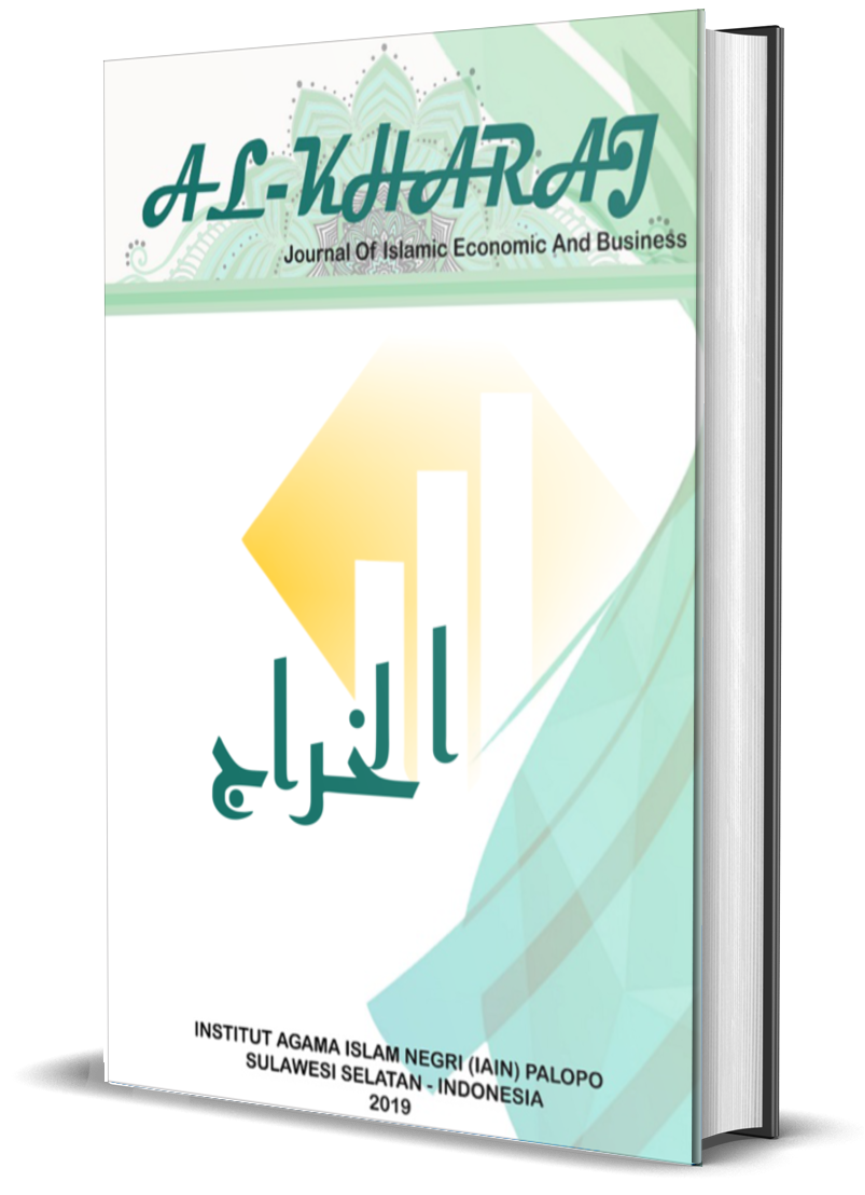The Importance of Sharia Economy in Religious Moderation
DOI:
https://doi.org/10.24256/kharaj.v5i4.4701Keywords:
Economy, Business, Sharia, Moderation, Religion.Abstract
References
Abbas, A. (N.D.). Agama Dan Kehidupan Ekonomi Menurut Sjafruddin Prawiranegara. 51.
Abd.Ghafur. (2018). Etika Bisnis Dalam Perspektif Islam Abd. Ghafur 1. Iqtishodiyah: Jurnal Ekonomi Dan Bisnis Islam, 2, 1–21.
Akhmadi, A., & Belakang, A. L. (2008). Moderasi Beragama Dalam Keragaman Indonesia Religious Moderation In Indonesia ’ S Diversity. 45–55.
Al-Falah, D. I. P. P., & Ahmad, N. (N.D.). Nilai-Nilai Moderasi Beragama. Kawangung 2019, 43–51.
Arif, K. M. (N.D.). Moderasi Islam (Wasathiyah Islam) Perspektif Al-Qur’an, As-Sunnah Serta Pandangan Para Ulama Dan Fuqaha Khairan Muhammad Arif. 22–43.
Ermansyah, E. (2022). Etika Bisnis Dalam Perspektif Islam. Jurnal Khazanah Ulum Ekonomi Syariah (Jkues), 5(2), 11–17. Https://Doi.Org/10.56184/Jkues.V5i2.133
Guru, P., Dalam, A., & Moderasi, M. (2020). Key Word: Moderation, Islamic, And Religious Teacher. 3, 37–51.
Gusriani, R. Y., & Faulidi, H. (2017). Dakwah Dalam Bisnis Dan Enterpreneur Nabi Muhammad Saw. Alhadharah: Jurnal Ilmu Dakwah, 11(21), 17–24. Https://Doi.Org/10.18592/Alhadharah.V11i21.1783
Hafizd, J. Z. (2022). The Importance Of Religious Moderation-Based Islamic Economic Education To The Community For The Realization Of Economic Justice In Indonesia Pentingnya Edukasi Ekonomi Syariah Berbasis Moderasi Beragama Kepada Masyarakat Bagi Terwujudnya Keadilan Ekonomi.
Heriyansyah, H. (2018). Perjalanan Bisnis Nabi Muhammad S.A.W. Ad Deenar: Jurnal Ekonomi Dan Bisnis Islam, 2(02), 190. Https://Doi.Org/10.30868/Ad.V2i02.356
Indahningrum, R. Putri, Naranjo, J., Hernández, Naranjo, J., Peccato, L. O. D. E. L., & Hernández. (2020). Https://Doi.Org/10.1016/J.Solener.2019.02.027%0ahttps://Www.Golder.Com/Insights/Block-Caving-A-Viable-Alternative/%0a???
Kalla, M. J., & Mokodenseho, S. (N.D.). Moderasi Beragama Perspektif.
Madjid, N. (2021). P-Issn: 2716-098x, E-Issn: 2716-0971. 3(01), 16–34.
Mubarok, A. A. (2018). Tasawuf Dan Internalisasi Moderasi Beragama Dalam Menghadapi Problematika Bangsa. 3(2).
Nashir, H. (2015). Moderasi Indonesia Dan Keindonesiaan Perspektif Sosiologi. 1–84.
Nurdin, F. (2021). Moderasi Beragama Menurut Al- Qur ’ An Dan Hadist. 18(1), 59–70.
Ri, K. A. (N.D.). No Title.
Sitepu, N. I. (2016). Perilaku Bisnis Muhammad Saw Sebagai Entrepreneur Dalam Filsafat Ekonomi Islam. Human Falah, 3(1), 18–33.
Studi, P., Ekonomi, H., Muamalah, S., & Al-Jawami, S. Y. (2018). Pertumbuhan Ekonomi Dalam Perspektif Islam Economic Growth In Islamic Perspective. 1(2).
Studi, P., Syariah, E., & Yudharta, U. (2017). No Title. 8, 227–242.
Sutrisno, E. (2019). Aktualisasi Moderasi Beragama Di Lembaga Pendidikan Actualization Of Religion Moderation In Education Institutions. 12(1).
Yogyakarta, P., Konsep, S., Perspekt, U., Ekonomi, I. F., Kepincangan, P., & Dalam, P. (N.D.). Kesejahteraan Dalam Perspektif Ekonomi Islam.
Yunia, N. (2018). Implementasi Etika Bisnis Islam Dalam Menjalankan Usaha Kecil. Jurnal Aksioma Al-Musaqoh, 1(1), 77–92.
Downloads
Published
How to Cite
Issue
Section
Citation Check
License
Authors retain copyright and grant the journal right of first publication with the work simultaneously licensed under a Creative Commons Attribution-ShareAlike 4.0 International License. In line with the license, authors are allowed to share and adapt the material. In addition, the material must be given appropriate credit, provided with a link to the license, and indicated if changes were made. If authors remix, transform or build upon the material, authors must distribute their contributions under the same license as the original.









